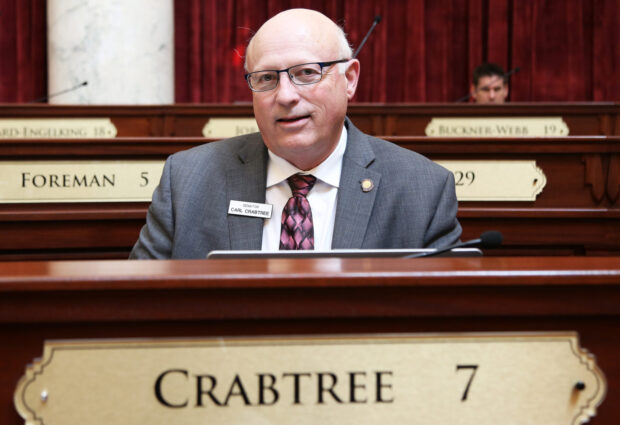
A divided Idaho Senate passed a non-binding resolution Wednesday decrying “critical race theory.”
Senate Concurrent Resolution 118 denounces “divisive content … appearing in school curriculum across that nation” that “seeks to disregard the history of the United Stated and the nation’s journey to becoming a pillar of freedom in the world.”
“Let’s teach our children how to think, not what to think,” sponsor Sen. Carl Crabtree, R-Grangeville, said.
The resolution passed on a voice vote after debate that was split across party lines, with Democrats warning of “censorship” and Republicans arguing it would encourage “fair and balanced” history education.
“I’m certainly in favor of learning about the great accomplishments of our country,” said Sen. David Nelson, D-Moscow. “But I also think we need to be able to learn from some of our country’s faults, even if they are hard to hear. Our children are not snowflakes.”
Passing the resolution marks another effort from Statehouse Republicans to legislate how history and race are discussed in the classroom. Concerns about “social justice agendas” have punctuated education discussions in the Legislature in recent years, and Idaho has experienced blowback against “critical race theory” that has spread throughout several conservative-leaning states.
SCR 118 also takes aim at the 1619 Project, a Pulitzer Prize-winning New York Times look into anti-Black racism’s role in the U.S.’ founding.
Sen. Melissa Wintrow took issue with that callout, saying, for “a resolution to single out single pieces of literature is inappropriate and borders on censorship.”
Wintrow, D-Boise, read from the Times’ work to defend it against accusations that it promotes division and racial tensions.
“’We are the most unequal of Western democracies. We incarcerate our citizens at the highest rate. We suffer the greatest income inequality. Americans’ lifespans are shorter than those of the people and nations we compare ourselves to. The 1619 Project seeks to explain this present-day reality and challenge these myths, not tear down or further divide this country as some critics suggest, but so that we can truly become the country we already claim to be.”’
The resolution instead backs the 1776 Commission, a Trump administration rebuke of the Times’ work, and declares that the Legislature supports teaching children in a way that views “history both clearly and wholly, not only the offenses but also the triumphs,” as “the faults of this great nation have been addressed throughout our history.”
Senate Republicans stopped short of saying Idaho teachers are indoctrinating their students, as some House Republicans and Lt. Gov. Janice McGeachin have alleged.
“We all know that critical race theory and the tearing down the (statues) and different things is taking place in other states,” said Sen. Steven Thayn, R-Emmett. “We don’t want that to happen here.”
Like all resolutions, SCR 118 isn’t binding, so it doesn’t force schools to make any changes to what they teach. It’s effectively symbolic.
And Crabtree emphasized that the resolution was not intended to force curriculum changes, but to promote a “fair and balanced view of education.”
The state already has a “non-discrimination” law that targets critical race theory, but doesn’t ban the teaching of the academic lens for viewing racism’s impact on institutions.
SCR 118’s passing sends it to the more-conservative House for a potential committee hearing.
